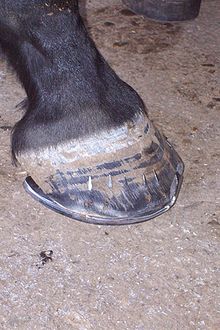pes
หน้าตา
ภาษาเช็ก
[แก้ไข]
การออกเสียง
[แก้ไข]- สัทอักษรสากล(คำอธิบาย): [pɛs]
เสียง: (file) - เทียบเสียงภาษาไทยโดยประมาณ: เปส
คำนาม
[แก้ไข]pes แม่แบบ:ชายมีชีวิต
การผัน
[แก้ไข]ตารางผันคำนาม pes
ภาษาละติน
[แก้ไข]

รากศัพท์
[แก้ไข]จากอินโด-ยูโรเปียนดั้งเดิม *pṓds (compare ภาษาสันสกฤต पद् (pád), โบราณ ภาษากรีก πούς (poús) and ภาษาอังกฤษเก่า fōt, ภาษาอังกฤษ foot).
การออกเสียง
[แก้ไข]- (คลาสสิก) สัทอักษรสากล(คำอธิบาย): /peːs/, [peːs̠]
- (คริสตจักร) สัทอักษรสากล(คำอธิบาย): /pes/, [pɛs]
(Classical): (file)
คำนาม
[แก้ไข]ข้อผิดพลาด Lua ใน มอดูล:la-nominal บรรทัดที่ 2484: Parameters 2, 3 and 4 are not used by this template.
- เท้า, ตีน, ในความหมาย
- ของมนุษย์
- ของสัตว์
- หน่วยวัดที่เกี่ยวกับเท้าของมนุษย์
- ฐานของภูเขา
- ทางใต้ของขาโต๊ะ, เก้าอี้
- (ในเชิงเปรียบเทียบ) ที่ที่วางเท้า เช่น ดิน, พื้น
- (ดนตรี) เวลา, จังหวะ
- (botany) ก้าน
การผันรูป
[แก้ไข]การผันรูปที่สาม
| การก | เอกพจน์ | พหูพจน์ |
|---|---|---|
| กรรตุการก | pēs | pedēs |
| สัมพันธการก | pedis | pedum |
| สัมปทานการก | pedī | pedibus |
| กรรมการก | pedem | pedēs |
| อปาทานการก | pede | pedibus |
| สัมโพธนการก | pēs | pedēs |
Hyponyms
[แก้ไข]- (metrical foot): trochaeus; pes dissyllbus or disyllbus, pes bibrevis, choreus, jambus, spondeus, spondius, spondeos (2-syllable feet); pes trisyllabus, amphibrachus, amphibrachys, amphimacrus, dactylus, extensipes, molossus, pes anapaestus, pes antanapaestus, pes antibacchius, pes bacchius, pes creticus, pes hippius (3-syllable feet); pes tetrasyllbus, antispastus, chorjambus, dichoreus, dijambus, dispondeus, epitritus, paeon, proceleumaticus, proceleusmaticus (4-syllable feet); pes pentasyllbus, dochmius, mesobrachys, mesomacros, pariambodes, probrachys, pes amoebaeus, pes antamoebaeus, pes orthius (5-syllable feet)
Meronyms
[แก้ไข]- (unit of length): decempeda (10 pedes)
ดูเพิ่ม
[แก้ไข]- pede tellūrem pulsō
- pedem effero
- pedem fero
- pedem refero
- pedes navales
- si in fundo pedem posuisses
- a pedibus usque ad caput
- alterno pede terram quatere
ลูกคำ
[แก้ไข]- adversipedes
- aenipes
- aeripes
- agipes
- alipes
- anguipes
- antepes
- avipes
- bipeda
- bipēs
- capripes
- celeripēs
- centipeda
- centipes
- citipes
- compes
- cornipes
- decempeda
- decempeda
- fissipes
- flammipes
- flexipes
- gracilipes
- hircipes
- ignipes
- lanipes
- latipes
- lentipes
- levipes
- longipes
- loripes
- milepeda
- mollipēs
- multipeda
- octipes
- palmipes
- peda
- pedālis
- pedāneus
- pedārius
- pedātim
- pedātūra
- pedātus
- pedeplana
- pedepressim
- pedēs
- pedetemptim
- pedica
- pedicinus
- pediculus
- pedisequus
- pedō
- pedocucullus
- pedūlis
- pedum
- planipes
- plumipes
- properipes
- quadrupēs
- remipes
- segnipes
- semipes
- septipes
- serpentipes
- sesquipes
- solidipes
- sonipes
- stapēs
- suppes
- tardipes
- tremipes
- uncipes
- unipes
- volucripes
คำที่เกี่ยวข้อง
[แก้ไข]ข้อผิดพลาด Lua ใน มอดูล:columns บรรทัดที่ 283: frame:expandTemplate: invalid type table for arg 'lang'
คำสืบทอด
[แก้ไข]- อารากอน: piet
- Aromanian: pezã
- อัสตูเรียส: pie
- คอร์ซิกา: pede
- แดลเมเชีย: pi
- อังกฤษ: pes
- เอสเปรันโต: piedo
- เอซเตรมาดูรา: pie
- ฟร็องโก-พรอว็องส์: pied
- ฝรั่งเศสเก่า: pié
- ฟรียูลี: pît
- อีโด: pedo
- อินเทอร์ลิงกวา: pede
- Istriot: peîe, pèie
- อิตาลี: piede
- เลออน: pía
- มีรังดา: pie
- Mozarabic: péde
- นาโปลี: pere
- กาลิเซีย-โปรตุเกสเก่า: pee
- อุตซิตาเก่า: pe
- อิตาลี: pé
- โรมาเนีย: piez
- โรมานช์: pe
- ซาร์ดิเนีย: pee, pei
- ซิซิลี: pedi, peri
- สเปน: pie
- เวเนโต: pìe, piè, pè
อ้างอิง
[แก้ไข]- “pes”, in Charlton T. Lewis and Charles Short (1879) A Latin Dictionary, Oxford: Clarendon Press
- “pes”, in Charlton T. Lewis (1891) An Elementary Latin Dictionary, New York: Harper & Brothers
- pes in Charles du Fresne du Cange’s Glossarium Mediæ et Infimæ Latinitatis (augmented edition with additions by D. P. Carpenterius, Adelungius and others, edited by Léopold Favre, 1883–1887)
- pes in Gaffiot, Félix (1934) Dictionnaire illustré latin-français, Hachette
- Carl Meißner; Henry William Auden (1894) Latin Phrase-Book[1], London: Macmillan and Co.
- to begin a journey (on foot, on horseback, by land): iter ingredi (pedibus, equo, terra)
- to go on foot: pedibus ire
- to trample under foot: pedibus obterere, conculcare
- to have the gout: ex pedibus laborare, pedibus aegrum esse
- to vote for some one's motion: discedere (pedibus), ire in alicuius sententiam (Liv. 23. 10)
- to serve in the cavalry, infantry: equo, pedibus merere (Liv. 27. 11)
- (ambiguous) a hand-to-hand engagement ensued: tum pes cum pede collatus est (Liv. 28. 2)
- (ambiguous) to fall at some one's feet: ad pedes alicuius accidere
- (ambiguous) to throw oneself at some one's feet: ad pedes alicuius se proicere, se abicere, procumbere, se prosternere
- (ambiguous) to prostrate oneself before a person: ad pedes alicuius iacēre, stratum esse (stratum iacēre)
- (ambiguous) to fail to see what lies before one: quod ante pedes est or positum est, non videre
- (ambiguous) to never set foot out of doors: domo pedem non efferre
- (ambiguous) to cross the threshold: pedem limine efferre
- (ambiguous) a hand-to-hand engagement ensued: tum pes cum pede collatus est (Liv. 28. 2)
- (ambiguous) hand to hand: collato pede (Liv. 6. 12)
- (ambiguous) to retire (without turning one's back on the enemy): pedem referre
- to begin a journey (on foot, on horseback, by land): iter ingredi (pedibus, equo, terra)
- “pes”, in Harry Thurston Peck, editor (1898) Harper's Dictionary of Classical Antiquities, New York: Harper & Brothers
- “pes”, in William Smith et al., editor (1890) A Dictionary of Greek and Roman Antiquities, London: William Wayte. G. E. Marindin
หมวดหมู่:
- ศัพท์ภาษาเช็กที่มีการออกเสียงไอพีเอ
- ศัพท์ภาษาเช็กที่มีลิงก์เสียง
- คำนามภาษาเช็ก
- แม่แบบหน้าที่คำนามภาษาเช็ก
- คำหลักภาษาเช็ก
- บทความที่ยังใช้ pn อยู่
- ภาษาเช็ก:สัตว์
- terms derived from the PIE root *ped-ภาษาละติน
- ศัพท์ภาษาละตินที่รับมาจากภาษาอินโด-ยูโรเปียนดั้งเดิม
- สันสกฤต terms with non-redundant manual transliterations
- หน้าที่มีลิงก์แดงภาษาสันสกฤต/m
- ศัพท์ภาษาละตินที่มี 1 พยางค์
- ศัพท์ภาษาละตินที่มีการออกเสียงไอพีเอ
- ศัพท์ภาษาละตินที่มีลิงก์เสียง
- la:ดนตรี
- la:Botany
- คำนามการผันที่สามภาษาละติน
- Latin words in Meissner and Auden's phrasebook
